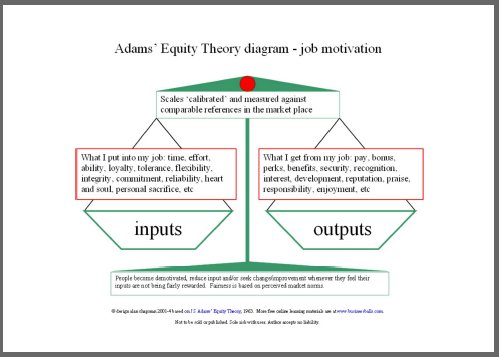The content theories focus on what motivates an individual and assume that they have a set of needs which they persue whereas the process theories concentrate on how they are motivated and how they achieve their goals by a process of calculation. The process theories are Vroom's Expectancy Theory, Locke's Goal Theory, and Adams' Equity Theory.
Expectancy Theory
The expectancy theory suggests that employees will be motivated to work when they think that the reward is worth putting effort into the task. The reward needs to be directly related to the task and has to be wanted and deserved by the employee. Vroom derived this model based on three variables; Valence, Instrumentality and Expectancy.
Valence: is the attractiveness and preference for a specific outcome of one individual. It is the anticipated satisfaction of the outcome, which differs from value which is the actual satisfaction of the outcome. So it is whether the employee believes that completing the task will benefit them or cause detriment.
Instrumentality can be divided in to first-level outcomes and second-level outcomes. First-level outcomes are performance related and second-level outcomes are need related which are gained through the achieving high performance. These are dependent on the actual outcome of the performance rather than just the effort put in.
Expectancy is when an individual chooses whether to put effort into a task based on preference for a particular outcome and also for the probability that the outcome will be achieved. People have a perception of the amount of probability that the choice of an action will actually lead to the desired outcome. This is expectancy.
Goal Theory
A theory derived by Edwin Locke which suggests that peoples' goals have an important effect on behaviour. The difficulty of the goal and the individual's commitment determines how much effort is put in. Difficult goals normally lead to a higher performance than easier goals as the employee is more challenged, but this only applies is the individual works towards them. Specific goals also lead to higher performance, rather than vague "do the best you can" goals. For the individual to fully achieve the goal and to feel motivated, feedback from management or the goal setter is crucial. So they can find out where they go wrong and work on it, instead of getting demotivated. The individuals commitment to the task is key, they cannot just abandon it.
Equity Theory
Equity theory focuses on people's feelings of how fairly they have been treated in comparison to their peers. It is mostly associated with the work of Adams. People in work have a perceived outcome of the reward they should be getting for putting in a high performance and they often compare this to what other employees are receiving. When there is an unequal comparison of ratios the individual experiences inequity. This feeling can cause tension, which is not wanted. Therefore the person would be motivated to remove this feeling of tension. Adams states six types of possible behaviour as a result of inequity.
Changes in inputs; a person may increase/decrease their level of input, such as quality and quantity of work.
Changes in outcomes; may attempt to change outcomes such as pay, working conditions, status, etc, without changes to inputs.
Cognitive distortion of inputs and outcomes; psycological distortion of their inputs and outcomes to achieve the same results.
Leaving the field; may try and find a new situation with more favourable balance by resigning or requesting a transfer.
Acting on others; may try to change another persons input, or cognitively distort the inputs and outcomes of others.
Changing the object of comparison; changing the reference group with whom the comparison is made.
How Innocent Drinks motivated its employees
One of the ways Innocent motivate their staff is by rewarding high performance by increased capacity to earn. By using this strategy they are following Locke’s goal theory because they are working towards making a profit for the company in return for them to earn more themselves. Innocent also used profit related pay, which relates to the expectancy theory as employees will expect higher earnings if they are improving the business’s earnings. Another way Innocent motivate their employees is by using the “Nest Egg” scheme. This is a scheme which allows high performers to purchase shares in the company at a discounted rate each year. The higher the performance rating, the more they add to your investment with free shares. By setting up the Nest Egg scheme, Innocent are following the expectancy theory, the reason being that they are motivating employees by making them believe that the reward they will get is worth putting the effort in for. This encourages higher performance from employees who want to earn more money.
In conclusion, these findings show that companies try to use different process theories to motivate their employees which shows that they value their staff highly, whilst also making a profit for the company.
Bibliography
Bibliography
- Mullins, L.J. (2010). Management & Organisational Behaviour. Essex: Pearson Education Ltd
- http://www.innocentdrinks.co.uk/
- Expectancy Theory of Motivation. Available: http://www.managementstudyguide.com/expectancy-theory-motivation.htm. Last accessed 2011.
- Reed, R. (2007), “Innocent Drinks”, growingbusiness.co.uk, 2011
- Newton, S. (2009), “Innocent Smoothies show others how to employ”, Genyguide.com, 2011
- Mindtools (2010), “Locke’s goal setting theory, Mindtools.com, 2011




Detailed theory base, well done. Remember to reference every source. Good links made with Innocent and Goal theory, but these could have developed. Bibliography?
ReplyDelete